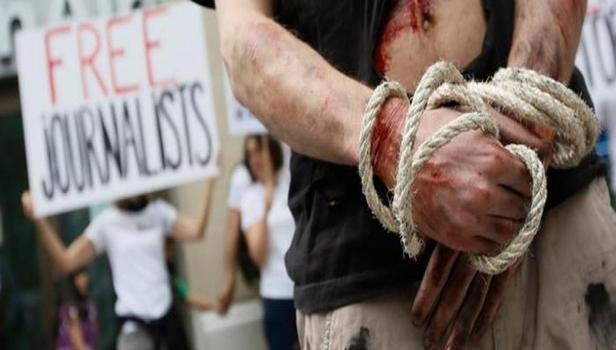Press Freedom in India and Pakistan is Undergoing a Serious Threat
03 May 2017 ( Perwez Anwer, MD & CEO, IBTN GROUP )
Many people in India and Pakistan media see evidence of the Pakistani media's strength against India.
At the same time, one of India's liberal channels, NDTV, dropped the interview of former Home Minister of India P Chidambaram, citing national security.
Radika Roy, co-founder and chairman of NDTV, said in a statement to the online publication 'The Wire', "Political splinter on the issue of surgical strikes, which was being used without evidence, was causing our national security to be damaged."
Pakistani journalists also feel that they are more brave and they can keep separate sides than their government's side compared to Indian journalists who support the government.
However, there can be no outcome of this debate. It proves that the freedom of the press is very bad in both countries.
Despite India being the world's largest democracy, despite its World Press Freedom Index published in 2017 by the 'Reporters Without Borders' Association, India is on the lower rungs on the scale of freedom of the press.
According to the World Press Freedom Index published in 2017, India's 136th position in the list of 180 countries shows that the freedom of the press in India is constantly worsing.
India is far behind countries like Zimbabwe and Myanmar.
Norway, Sweden and Finland are the world's leading journalists in bold journalism.
In this case, China is ranked 176th and Pakistan is ranked 139th.
'Reporters Without Borders' has said in its report, "The independence of the press in India is threatened by Modi's nationalism and the media is not printing news due to fear."
According to the report, "Self censorship is increasing in the Indian media and journalists are targets for the online campaign to defame the hardline nationalists. Journalists who are critical of the government are being prosecuted to stop them. "
In India, four journalists were killed in 2015 and at least one journalist has been attacked every month. In many cases, criminal cases have been registered against journalists. The result has been that journalists have put themselves on the censorship.
"The scope of these attacks is shocking. In the name of national security, the Internet and newspapers were banned in Kashmir. There have also been incidents of defamation of corporate fraud, murder of independent journalists after reporting on corruption of the local Mafia and Chhattisgarh's security forces tortured and sent to jail independent journalists," says Geeta SeShu of the media watchdog The Hoot Dot ORG.
Given the current tension in India's Kashmir, the government has imposed various types of curb on the freedom of the press. Journalists were not passed during the curfew, journalists were attacked, the dissemination of newspapers in the state was stopped, and the newspaper, Kashmir Reader, was completely banned.
If a newspaper was banned in any other part of the world, it would have been a ruckus, but the Indian media has largely ignored it.
Senior journalist Rajdeep Sardesai writes on this, "Today the World Press is the Independence Day. India is 136 and Pakistan is ranked 139th. A lot has been said. Greet those selected people who are still raising the voices."
In his next tweet, Rajdeep wrote, "The truth is that the press has a great tradition of freedom in India. This freedom has been misused due to business models and personal interests.''
At the same time, former Justice Markandey Katju wrote on Facebook, "World Press Independence Day is the world's biggest manipulation. Press freedom is a myth and a cruel joke with the public.
He wrote, "The world is in the hands of the corporate, whose sole purpose is to make maximum profit. Actually there is no press freedom."
Katju wrote, "Big journalists take a heavy salary and for this reason they have become accustomed to fancy lifestyles. They will not want to lose it and therefore only follow orders and lick the lamps."
The situation of democracy in Pakistan is also shaky, extensively in Pakistan, so it is not surprising that Pakistan is at 139th position in the World Press Freedom Index. These rankings do not match the claim of Pakistan's free media.
The Report of Reporters Without Borders of the 2016 said about Pakistan, "The targets that the journalists make are included in the extremist groups, Islamic organizations, intelligence agencies. They obstruct the freedom of the press. They all are fighting each other, but as always they are ready to hurt the media. In such cases, news organizations have adopted self-censorship."
Raza Rumi, a Pakistani journalist living in the United States in Pakistan attacked the assassination of the murderer in 2014, and says, "As far as Pakistan is concerned about national security, in some places in English newspapers to express different views But the opposition of the power establishment in TV news is quite dangerous. Institutions do not allow it."
Rumi used to host a TV show and had argued differences with Pakistan's foreign policy and raised the issue of rights of minorities.
During reporting on the issue of human rights in Balochistan, there was a fatal attack on the famous Anchor and journalist Hamid Mir in 2014. Then Mir's brother came to the TV channel and blamed the Pakistani army for the attack.
By the way physical assault and direct censorship - a small part of the problem is full, efforts to curb media in India and Pakistan are increasing.
In the telegraph newspaper Manini Chatterjee wrote, " Perhaps any one rarely know difference between censorship-self censorship, truth-propaganda and journalism-blind nationalism devotion."
Not only that, the Bharatiya Janata Party government led by Narendra Modi in India has reduced the methods of reaching journalists till the news and has promoted PR so that news of media can be controlled in a better way.
There is more pressure from the army in Pakistan. Ayesha Siddika's articles which consistently write on Pakistan's security policies are rejectioned several times in Pakistan and they appear to be more in India.
Ayesha Siddika wrote in the Pakistani newspaper The News, "At present, the head of the Inter Service Public Relation is Lieutenant General, the PR Agency of the Army is running a large-scale radio channel today, there is a stake in many TV channels. Finance to the film and the theater. It is not just an institutional extension, but it is a matter of shaping the voice of the country (Pakistan) media."
Journalists in Pakistan are not allowed to go freely in Balochistan. In such a situation, which country's media is more free, there can be no outcome of this debate.
The freedom of the press in both India and Pakistan is going through a period of serious danger.
(Click here for Android APP of IBTN. You can follow us on facebook and Twitter)
Share This News
About sharing
-
 16 Sep 2025
UN inquiry finds Israel’s war on Gaza to be genocide
16 Sep 2025
UN inquiry finds Israel’s war on Gaza to be genocide
UN inquiry finds Israel’s war on Gaza to be genocide
-
 16 May 2025
Has Donald Trump taken US-Gulf relations to a new era?
16 May 2025
Has Donald Trump taken US-Gulf relations to a new era?
Has Donald Trump taken US-Gulf relations to a new era?
May 16, 2...
-
 16 May 2025
What do the Gulf states gain from the US president's historic trip to the region?
16 May 2025
What do the Gulf states gain from the US president's historic trip to the region?
What do the Gulf states gain from the US president's historic trip to the regio...
-
 15 May 2025
Pakistan FM: US didn't force the ceasefire with India | Talk to Al Jazeera
15 May 2025
Pakistan FM: US didn't force the ceasefire with India | Talk to Al Jazeera
Pakistan FM: US didn't force the ceasefire with India | Talk to Al Jazeera
-
 15 May 2025
How will the lifting of US sanctions help Syrians rebuild their country?
15 May 2025
How will the lifting of US sanctions help Syrians rebuild their country?
How will the lifting of US sanctions help Syrians rebuild their country?



